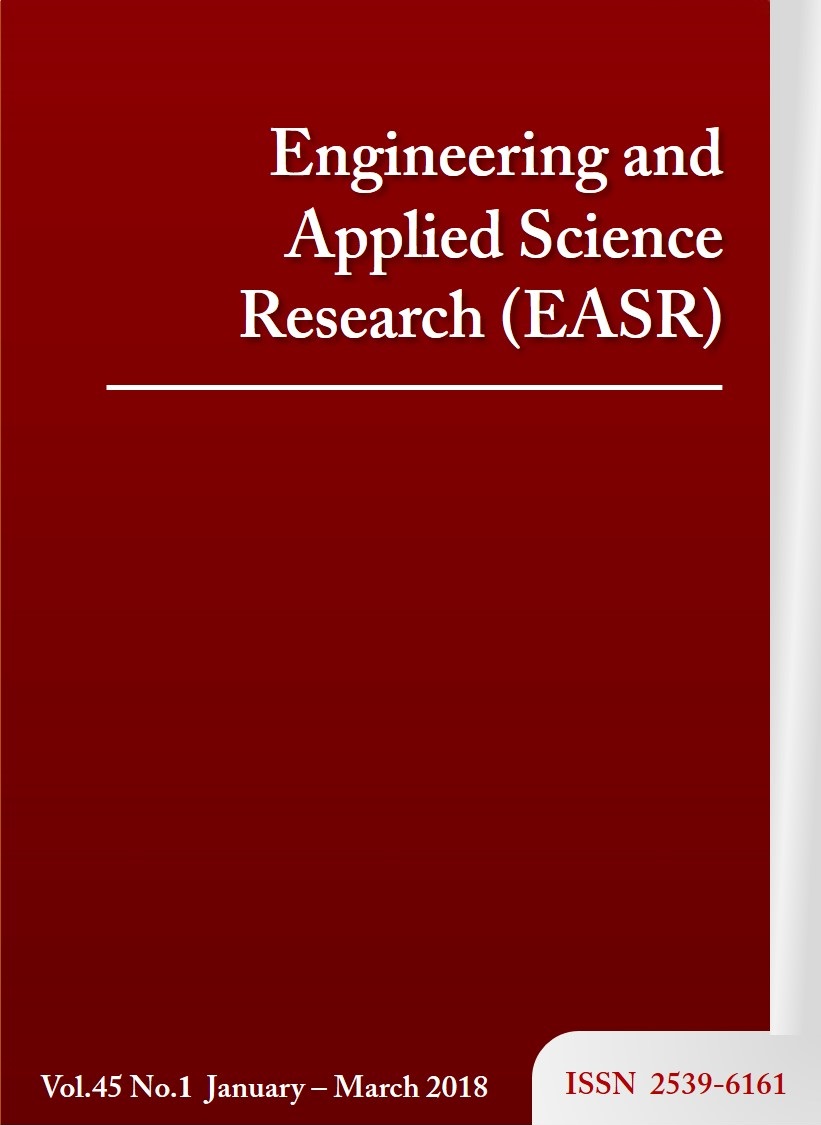Analysis of microlayer defects of a functionally graded titanium alloy by electrical discharge machining
Main Article Content
Abstract
This paper reports on the surface characteristics of a functionally graded Titanium (Ti-6Al-4V) alloy during Electrical Discharge Machining (EDM). The electrical discharge input parameters employed for this work are current (I), on-time (Ton), off-time (Toff) and spark gap voltage (V). The electrode used for EDM of the titanium workpieces is an electrolytic copper electrode. The two machining processes employed are at room temperature and sub-zero temperature using liquid nitrogen at -1600C as electrode coolant during the process. EDM machining was designed for all the input parameters and the materials machined with three different currents, i.e., 4.5A, 5.5A and 7.5A, while the workpieces were examined for microlayer defects using scanning electron microscopy (SEM). The result showed an average micro‑layer thickness of 24.47 μm with current of 7.5A when machined at -1600C. Also an increase in crack formation with the highest current of 7.5A for the surfaces machined at subzero temperature was recorded for both the workpieces and electrode materials.
Article Details
This work is licensed under a Creative Commons Attribution-NonCommercial-NoDerivatives 4.0 International License.
References
Lee, H. T., & Tai, T. Y. Relationship between EDM parameters and surface crack formation. Journal of Materials Processing and Technology, 2003; 142, 676-683.
Fonda, P., Wang, Z., Yamazaki, K., & Akutsu, Y. A fundamental study on Ti-6Al-4V’s thermal and electrical properties and their relation to EDM productivity,. Journal of Materials ProcessingT echnology, 2008; 202, 583-589. doi: 10.1016/j.jmatprotec.2007.09.060.
Keskin, Y., Halkaci, H. S., & Kizil, M. An experimental study for determination of the effects of machining parameters on surface roughness in EDM. International Journal of Advanced Manufacturing Technology 2006; 28, 1118-1121.
Abdulkareem, S., Khan, A. A., & Konneh, M. Reducing electrode wear ratio using cryogenic cooling during electrical discharge machining. International Journal of Advanced Manufacturing Technology, 2009; 45(1146). doi: 10.1007/s00170-009-2060-5
Hascalik, A., & Caydas, U. A comparative study of surface integrity of Ti-6Al-4V alloy machined by EDM and AECG, . Journal of material processing Technology 2007; 190, 2007, 173-180, 190, 173-180.
Gaikwad, V., & Jatti, V. S. Optimization of Material Removal Rate During Electrical Discharge Machining of Cryo-Treated NiTi Alloys using Taguchi’s Method. Journal of King Saud University – Engineering Sciences. doi: 2016; http://dx.doi.org/10.1016/j.jksues.2016.04.003
Gu, L., Li, L., Zhao, W., & Rajurkar, K. P. Electrical Discharge Machining of Ti6Al4V with a Bundled Electrode. International Journal of Machine Tools and Manufacture, 2012; 53(1), 100-106.
Lee, H. T., Rehbach, W. P., Tai, T. Y., & Hsu, F. C. Relationship between electrode size and surface cracking in the EDM machining process. Journal of Materials Science, 2004; 39, 6981-6986.
Abdulkareem, S., Khan, A. A., & Konneh, M. Influence of Electrode Cooling on Recast Layers and Micro Crack in Electrical Discharge Machining of Titanium. Advanced Materials Research, 2011; 264-265, 1180-1186. doi: 10.4028/www.scientific.net/AMR.264-265.1180
Lee, S. H., & X.P., L. Study of the Effect of Machining Parameters on the Machining Characteristics in Electrical Discharge Machining of Tungsten Carbide. Journal of Materials Processing Technology, 2001; 115, 344-358.
Yan, B. H., Tsai, H. C., & Huang, F. Y. The effect in EDM of a dielectric of a urea solution in water on modifying the surface of titanium. International Journal of Machine Tools and Manufacture, 2005; 45, 194-200.
Tsai, H. C., Yan, B. H., & Huang, F. Y. EDM performance of Cr/Cu-based composite electrodes. International Journal of Machine Tools Manufacturing, 2003; 43, 245-252.
Yildiz, Y., Sundaram, M. M., Rajurkar, K. P., & Nalbant, M. The Effects of Cold & Cryogenic Treatments on the Machinability of Beryllium-Copper Alloy in EDM. 2011; Paper presented at the CIRP Conference on Manufacturing Systems, , Madison, Wisconsin.
Li, J., Liu, X., & Zhao, S. Prediction model of recast layer thickness in die-sinking EDM process on Ti-6Al-4V machining through response surface methodology coupled with least squares support vector machine. Computer Modelling & New Technologies, 2014; 18(7), 398-405.
Puertas, C. J., Luis, & Villa, G. Surface roughness parameters study on the EDM of silicon carbide. Journal of Materials Processes Technology, 2005; 164-165, 1590-1596.
Srivastava, V., & Pandey, P. M. Effect of Process Parameters on the Performance of EDM Process with Ultrasonic Assisted Cryogenically Cooled Electrode. Journal of Manufacturing Processes, 2012; 14(3), 393-402.
Liqing, L., & Yingjie, S. Study of Dry EDM with Oxygen-Mixed and Cryogenic Cooling Approaches 2013; Paper presented at the The Seventeenth CIRP Conference on Electro Physical and Chemical Machining. 2013
Singh, S., Maheshwari, S., & Pandey, P. C. Some Investigations into the Electric Discharge Machining of Hardened Tool Steel using Different Electrode Materials. Journal of Materials Processing Technology,, 2004; 149, 272-277.
Tang, L., & Du, Y. T. Experimental Study on Green Electrical Discharge Machining in Tap Water of Ti6Al4V and Parameters Optimization. International Journal of Advanced Manufacturing Technology, 2014; 70, 469-475. doi: 10.1007/s00170-013-5274-5



